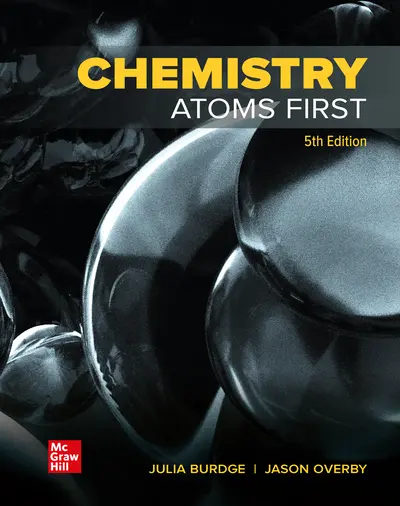My Account Details

ISBN10: 1266280413 | ISBN13: 9781266280412

* The estimated amount of time this product will be on the market is based on a number of factors, including faculty input to instructional design and the prior revision cycle and updates to academic research-which typically results in a revision cycle ranging from every two to four years for this product. Pricing subject to change at any time.
Instructor Information
Quick Actions (Only for Validated Instructor Accounts):
The Atoms First approach provides a consistent and logical method for teaching general chemistry. This approach starts with the fundamental building block of matter, the atom, and uses it as the stepping-stone to understanding more complex chemistry topics. Once mastery of the nature of atoms and electrons is achieved, the formation and properties of compounds are developed. Only after the study of matter and the atom will students have sufficient background to fully engage in topics such as stoichiometry, kinetics, equilibrium, and thermodynamics.
Chapter 2: Atoms and the Periodic Table
Chapter 3: Quantum Theory and the Electronic Structure of Atoms
Chapter 4: Periodic Trends of the Elements
Chapter 5: Ionic and Covalent Compounds
Chapter 6: Representing Molecules
Chapter 7: Molecular Geometry, Intermolecular Forces, and Bonding Theories
Chapter 8: Chemical Reactions
Chapter 9: Chemical Reactions in Aqueous Solutions
Chapter 10: Energy Changes in Chemical Reactions
Chapter 11: Gases
Chapter 12: Liquids and Solids
Chapter 13: Physical Properties of Solutions
Chapter 14: Chemical Kinetics
Chapter 15: Entropy and Gibbs Energy
Chapter 16: Chemical Equilibrium
Chapter 17: Acids, Bases, and Salts
Chapter 18: Acid-Base Equilibria and Solubility Equilibria
Chapter 19: Electrochemistry
Chapter 20: Nuclear Chemistry
Chapter 21: Environmental Chemistry
Chapter 22: Coordination Chemistry
Chapter 23: Organic Chemistry
Chapter 24: Modern Materials
Chapter 25: ONLINE ONLY CHAPTER: Nonmetallic Elements and Their Compounds
Chapter 26: ONLINE ONLY CHAPTER: Metallurgy and the Chemistry of Metals
Accessibility
Creating accessible products is a priority for McGraw Hill. We make accessibility and adhering to WCAG AA guidelines a part of our day-to-day development efforts and product roadmaps.
For more information, visit our accessibility page, or contact us at accessibility@mheducation.com
Need support? We're here to help - Get real-world support and resources every step of the way.